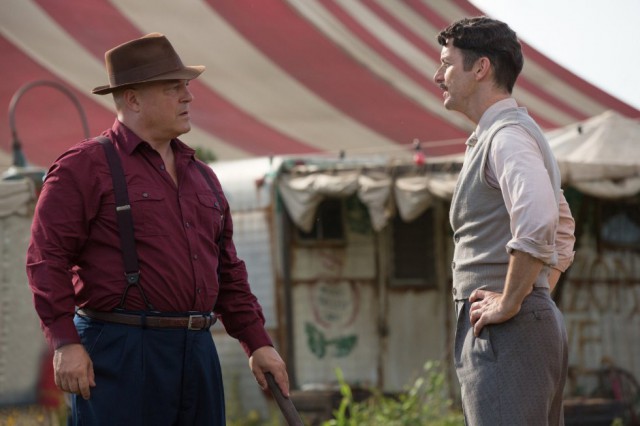
American Horror Story: Freak Show, Episode 7: “Test of Strength”
Written by Jessica Sharzer
Directed by Michael Uppendahl
Airs Wednesdays at 10pm ET on FX
Freak Show’s storytelling has frequently revolved around balancing character development between stories. Similar to Game of Thrones, the season has featured a variety of small plot arcs based on different characters and they’ve coalesced to make the mosaic that is the show. This week’s episode, “Test of Strength,” features Dell to a greater extent than the season has previously, and particularly his relationship with Jimmy. Unfortunately, his character is not nearly as interesting as others that the show has explored.
The episode’s title refers to the carnival strength game where the episode first shows Dell engaged in a verbal duel with Stanley. He lets Dell know that he knows about his fondness for the gay bar, and he threatens to share his information with the other performers unless he can deliver the body of a freak.
Dell’s lack of interest as a character is a major problem with this episode, though far from the only one. Though subtlety has never been the strength of this show, particularly when it comes to character development, he feels exceptionally weak. His machismo-as-cover-for-inadequacy shtick works in the background and as a foil to other character arcs, but he fails to hold the viewer’s attention on his own. There’s been no shortage of “tough guy” deconstructions on television in recent years and Dell doesn’t make for a particularly intriguing addition to the canon.
Equally messy is Dell’s choice of targets. He first goes after Amazon Eve, followed by an attempted attack on Jimmy. In both cases, the desire to depict the drama of the fallout from the attempt overwhelms the narrative logic. It’s unclear why he would pick two of the most powerful members of the troupe as his targets, particularly when more vulnerable performers could be easily dispatched.
Unfortunately, the resulting interactions don’t do much to justify the logical leaps. In the case of Amazon Eve, he gets accused of trying to perpetrate rape, which leads to harsh judgements from Ethel and others. Given the antagonistic relationship that already exists between him and Ethel, the argument doesn’t exactly shed any new light on the two characters. The spat comes off as meaningless bile—a conflict in which the viewer struggles to care much about either side.

The reaction to his next attempt gets injected with a hefty dose of melodrama when he goes after Jimmy. Dell invites Jimmy out for drinks and makes a half-assed effort at knocking him out, but he becomes too crippled with guilt to go through with the assault. He could be trying both to get the body Stanley asks for and to exorcise his demons here, and writer Crystal Liu suggests that both may be possible motivations. However not enough time has been invested in the relationship on the part of the writers to interest the viewer in the conflict. Both the tension and the reconciliation between the two feel like hollow attempts at emotional manipulation that fail to be dramatically effective.
In the end, he finds a more rational victim: Ma Petit. Her naivety endures right until her death, as she allows him to give her a dress before he follows up his gift by brutally murdering her. He gives Stanley the body, and the tag features her on display at a museum (in the vein of Stanley’s fantasies in “Pink Cupcakes,” though presumably this time it’s real). As with the other deaths, the emotional payoff isn’t particularly strong, since the viewer doesn’t learn enough about Ma Petit as a character to mourn her death. Naturally, the image of the strong man crushing the weak woman is upsetting, but there’s not much substance beyond the shock value. As with much of Freak Show, the campy elements work much more effectively than the attempts at melodrama. Still, even by the standards of the season, the characterization of Dell feels especially clumsy.


